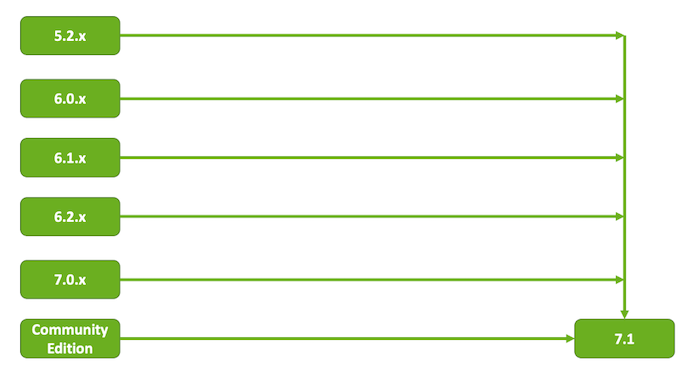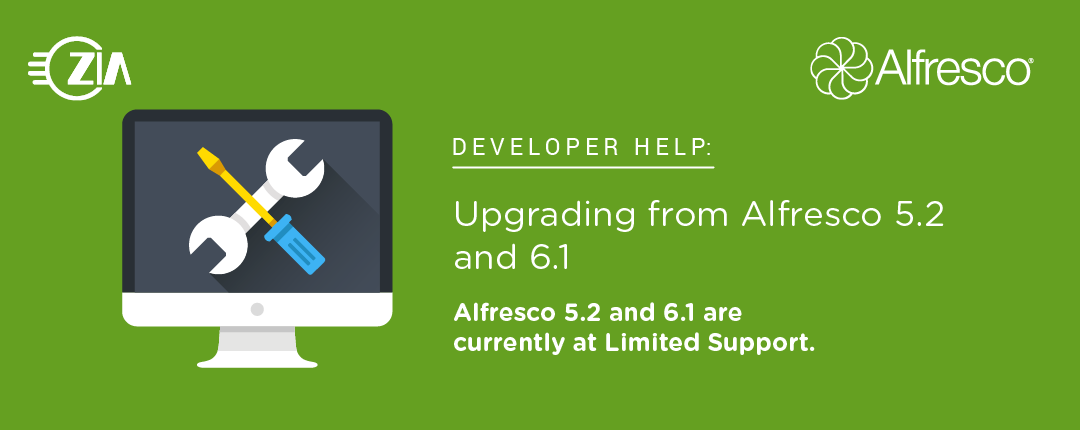End of Maintenance
Alfresco 5.2 and 6.1 are currently at Limited Support.
Many customers running on Alfresco products are on version 5.2. These are nearing the end of maintenance dates as noted below, and for those customers, an upgrade to the latest version is the appropriate next step. In the article, we explain what happens when the product is under Limited Support or end of maintenance. We then explain in detail considerations to take into account when contemplating an upgrade to Alfresco 7. Finally, we make recommendations and explain the things that have changed up to Alfresco 7.
EOM dates
- Alfresco 5.2 and 6.1 end of maintenance in February, 2022
- Alfresco 6.0 entered end of maintenance in July, 2021
- Full list of products and dates can be found here: Alfresco Product Support Status
What happens?
(Information taken from this page: Product Support Lifecycle)
- On the date a product version enters end of maintenance, the following applies:
- The product version has matured to the Extended Support Program, with limited support offered by Alfresco Support.
- Code changes are no longer being made to this product.
- Alfresco Support will direct customers to upgrade to a supported version of the product to address unexpected software behavior that cannot be resolved by the Support Analyst Team.
- Customers can stay on an unsupported version, but only knowledge base support articles will be available. Customers may elect to get limited support through the Extended Support Program.
Support lifecycle
Things to be aware of when upgrading to Alfresco 7:
- Upgrading directly to the latest Alfresco version from Alfresco 5.2.x and above is now possible. No intermediary version upgrades required. For example, customers can upgrade from 5.2 to 7.1 without any intermediary version upgrades.

- Alfresco has introduced and enhanced their architecture. The following changes are things to be aware of:
- Changes to installation and deployment options and architecture.
- New deployment options which support containerized deployment options and manual deployment options.
- Alfresco no longer provides executable installers; Ansible playbooks are provided as a partial replacement to the executable installers.
- Changes to the transformation and rendition architecture.
- New transformation service architecture replaces the embedded transformation service and rendition service, improving the performance and scalability of renditions and transformations.
- Any custom transformation engines must be ported to the new architecture.
- Changes to how custom jobs are registered may also require code changes.
- Changes to supported platforms.
- Alfresco has reduced support.
- Alfresco Process Services Share Connector is no longer supported starting in Alfresco Content Services 6. For example, Alfresco no longer supports Solaris, DB2, JBoss, WebSphere, and WebLogic.
- Changes to installation and deployment options and architecture.
- Existing Search Services must be upgraded to Alfresco Search Services 2.x (Solr) or Alfresco Search Enterprise (Elastic). A full reindex will be required.
- Existing Alfresco extension and customization source code leveraging the Alfresco SDKs should migrate to the latest Alfresco SDK.
- Alfresco has introduced many new applications and enhancements:
- Alfresco Digital Workspace, a new modern user interface, streamlined to enhance the end user’s experience when interacting with Alfresco Content Services.
What’s new between 5.2 and 7.1:
- 6.0 was about going to Docker/Kubernetes-based deployments.
- 6.1 was about adding some infrastructure (identity service, transform service, and digital workspace).
- 6.2 was about improving the transform service.
- 7.0 is mostly infrastructure improvements, so the repo can scale better and work better in cloud deployments.
- 7.1 Adds official support for Search Services 3, which is based on Elasticsearch. Be aware of reduction in functionality from previous versions of search services.
What may not be clear is that there have been literally hundreds of 3rd party libraries updated to address performance and security concerns. Additionally, there have been hundreds of changes to the base product for performance and security. The supported platforms have been moved forward with each release and, in particular, support for running in the cloud has moved a long way forward.
Here are some notes:
Release notes here: https://community.hyland.com/Products/alfresco/release-notes/release-notes/Alfresco-Content-Services-version-6-0
- Containerized deployment
- Code Organization
6.0 to 6.1: Release notes here: https://community.hyland.com/Products/alfresco/release-notes/release-notes/Alfresco-Content-Services-version-6-1
- Alfresco Digital Workspace
- Alfresco Identity Service (SSO)
- ActiveMQ
- Transform Service
- Cloud Deployment Templates
- Java 11 Support
6.1 to 6.2: Release notes here: https://community.hyland.com/Products/alfresco/release-notes/release-notes/Alfresco-Content-Services-version-6-2
- Custom Transforms and Renditions
- Core Transform Engines
6.2 to 7.0: Release notes here: https://community.hyland.com/Products/alfresco/release-notes/release-notes/draft-alfresco-content-services-version-70-draft
- Query accelerator: New solution to provide highly-scalable directed searches.
- Installation and deployment: New installers and utilities for bare-metal and containers deployments.
- Database improvements: Read/write/ingestion updates.
- Security and risk management: PII marking, security marks, privacy compliance
- Customizations: new out-of-process SDK.
- Content-centric process: Content archiving.
- Early access to Search 3.0 with Elasticsearch: This is ideal for customers who want to evaluate Elasticsearch for ACS as an alternative to Solr ahead of the full release later this year.
- User-centric workplace: Offline mobile support, Microsoft 365 collaboration.
- Productivity intelligence: AI searches for video/audio, BI tools.
7.0 to 7.1: Release notes here:
- Secure SDK events gateway for event management: Developers benefit by using Event SDK with secure mechanism to control ACS Event access.
- Support for Alfresco Search Enterprise 3.0 with Elasticsearch: Enables organizations to easily deploy, use and scale Elasticsearch with Alfresco.
- Support for Direct Access URLs: Enables the acceleration of the local download of content to aid distributed content repos in customer environments, cloud deployments.
Customers upgrading from 5.2 should understand that the installer doesn’t exist anymore and they will have to choose between several install options:
- Install locally with Ansible (only Linux-based and does not directly support clustering).
- Docker Compose-based (provided compose files need significant updates for security and shared storage).
- Kubernetes (provided Helm charts require some tweaking and the confidence to run production workloads on Kubernetes).
- Manual install (or zip install).
View this PDF for more on “What’s New in Alfresco Content Services 7.”
Zia Recommendations
- Engage with Zia for an Upgrade Health Check and Assessment
- Activities may include:
- Analyze current state of Alfresco including sizing, architecture, customizations and extensions, and overall general repository and system health.
- Identify opportunities for improvement and offer guidance on best practices
- Provide guidance and recommendations on future state architecture and new services.
- Provide guidance and/or develop an upgrade plan, approach and roadmap, etc.
- Activities may include:
Conclusion
If you are running on Alfresco version 5.2, it’s time to consider an upgrade. These products are nearing the end of maintenance and will be under Limited Support. There are several considerations to take into account when contemplating an upgrade to Alfresco 7 and Zia can help you navigate through them. Contact us to discuss your unique needs today.


